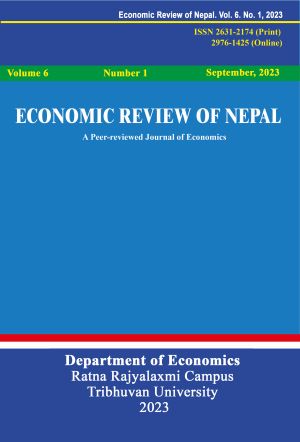Impact of Socioeconomic Globalization and Institutional Quality on Human Capital Development in Nepal: A Markov Regime Switching Analysis
DOI:
https://doi.org/10.3126/ern.v6i1.67969Keywords:
globalization, human capital, policy score, transition probabilities, Markov switching, NepalAbstract
Human capital development is a catalyst for the economic growth of a nation. This study employed the Markov regime-switching model to examine the impact of socioeconomic globalization and institutional quality on human capital development in Nepal, using data from 1980 to 2018. The findings revealed that social globalization promotes human capital development in Nepal, whereas institutional quality impedes it. Additionally, economic globalization either negatively impacted or did not significantly contribute to human capital development in both regimes. Financial development was found to severely hamper human capital development, while inflation had a positive effect in both regimes. The results offer insights that the quality of institutions within the globalized context of Nepal is crucial for enhancing human capital development. This improvement could stimulate private-sector financing and alleviate the crowding-out effects of government spending and policy shifts. Consequently, the policy implication of this research is that Nepal should prioritize enhancing institutional quality and fostering social globalization while addressing the adverse effects of economic globalization and financial development to bolster human capital development.
Downloads
Downloads
Published
How to Cite
Issue
Section
License
Copyright (c) 2023 Department of Economics, Ratna Rajyalaxmi Campus

This work is licensed under a Creative Commons Attribution-NonCommercial 4.0 International License.
This license enables reusers to distribute, remix, adapt, and build upon the material in any medium or format for noncommercial purposes only, and only so long as attribution is given to the creator.




